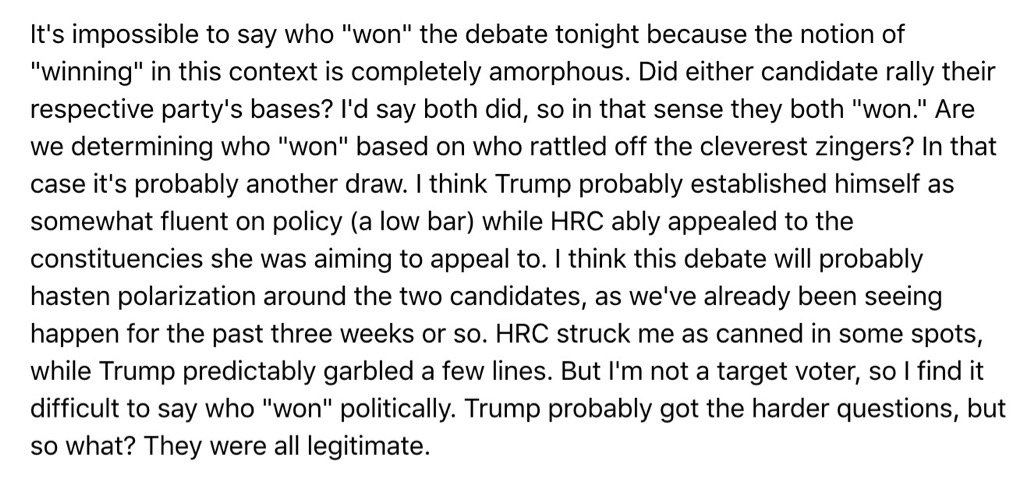Pundits Say Trump "Blew It" and Clinton "Won"—But What Do They Know?
'The lesson of the 2016 primary,' observes Glenn Greenwald, 'was that literally nothing is a less reliable indicator of debate impact than the reactions of journalists.'
by
While the punditry—and not just on the left—was quick to hand a "win" to Democratic nominee Hillary Clinton after Monday night's presidential debate against GOP opponent Donald Trump, unscientific post-debate polls out Tuesday morning serve as a reminder to look outside the political echo chamber.
In the aftermath of a face-off widely denounced as short on substance, many commentators said Clinton clearly "won" and Trump "blew it."
"In her zeal to defeat her opponent, which she clearly did, Clinton didn't do enough to inspire and motivate her base."
—Richard Eskow, Campaign for America's Future
—Richard Eskow, Campaign for America's Future
From gloating over profiting from the 2008 housing crash ("That's called business, by the way") to broadcasting his cutthroat business practices ("Maybe he didn’t do a good job, and I was unsatisfied with his work," Trump said when accused of stiffing a worker on his wages) to boasting about not paying federal income tax ("That makes me smart"), the New York real estate mogul delivered several gaffes "that may come back to haunt him on social media and in campaign ads in the days to come," as the Guardian wrote.
There were more substantive missteps, too.
When asked about repairing race relations in the United States, Trump focused on "law and order" and advocated bringing back the unconstitutional (and ineffective) practice of "stop-and-frisk" policing. Later, he congratulated himself for his role in the so-called "birther" movement.
"Race has always been at the core of Trump's campaign," wrote Simon Maloy for Salon. "On Monday night, a broad swath of Americans got to see that ugly reality. He lurched back and forth from not understanding how racism works to celebrating and reaffirming his central role in promulgating a racist conspiracy theory. Either one of those things should be disqualifying in a candidate for president of the United States."
And while he scored a few points by hitting Clinton early on trade, Trump "came up short and ran into a details-obsessed opponent" on the economy, as Politico reported.
"Pressed by moderator Lester Holt for details on how he would get jobs back, Trump muddled through a digression on China devaluing its currency (it has actually been appreciating) and saying we have to 'stop them from leaving'," Politico wrote. "Exactly how was unclear beyond the imposition of large import taxes that many economists believe would spark damaging and possibly recession-inducing trade wars."
Still, while Clinton "took him down on issue after issue, from his tax returns to his business practices," wrote Campaign for America's Future senior fellow Richard Eskow, "that was not her most important mission."
"Clinton's fate rests on her ability to turn out key Democratic voters in large numbers, especially young people and minorities," he explained. "In her zeal to defeat her opponent, which she clearly did, Clinton didn't do enough to inspire and motivate her base."
Indeed, Eskow wrote, the debate overall showcased "too much talk about the candidates—about Clinton's stamina, emails, and personality, or Trump's taxes, temperament (which he claimed was 'my greatest asset'), and fibbing—and too little about the voters: their fears, their needs, their dreams, and their changes for a better future."
It makes sense, then, that the debate served only to further entrench voters on both sides, as VICE columnist Michael Tracey wrote on Twitter:
Filmmaker Michael Moore added:
It's over. Trump, the egoist, the racist, the narcissist, the liar, "won." We all lost. His numbers will go up. She told the truth. So what.
Sure enough, many unscientific online snap surveys dubbed Trump the victor—leading Fox News to note: "the disconnect in judging Trump's performance was reminiscent of the Republican Party primary, when pundits often said his competitors bested him while online polls put him on top."
Journalist Glenn Greenwald similarly observed on Twitter:
The lesson of the 2016 primary was that literally nothing is a less reliable indicator of debate impact than the reactions of journalists.
Though Fox News notes such surveys "are not scientific and, in many cases, supporters of either candidate can cast multiple ballots," the news outlet adds: "Experts say the online polls are a good gauge of enthusiasm, which could mean Trump's performance was enough to energize those who already backed him."
"The real test of who won and who lost will likely come in the next wave of scientific polling in what has become a dead-even race," wrote the conservative news outlet. "If Trump continues to surge in key battleground states, it will be taken as evidence he accomplished what he needed to in the debate. If Clinton stops or even reverses his momentum, she may be retroactively declared the winner."
But with many Americans yearning for a deeper discussion of issues ranging from U.S. interventionism to tax reform to the just transition to renewable energy, "it doesn't really matter who 'won' this stretch of the horse race Monday night," columnist John Countswrote in an op-ed for Mlive.com—or, for that matter, who wins the next round of polls.
"What's more important is who the real losers are in all of this," he said. "Us."
This work is licensed under a Creative Commons Attribution-Share Alike 3.0 License
http://www.commondreams.org/news/2016/09/27/pundits-say-trump-blew-it-and-clinton-won-what-do-they-know



0 Comments:
Post a Comment
Subscribe to Post Comments [Atom]
<< Home